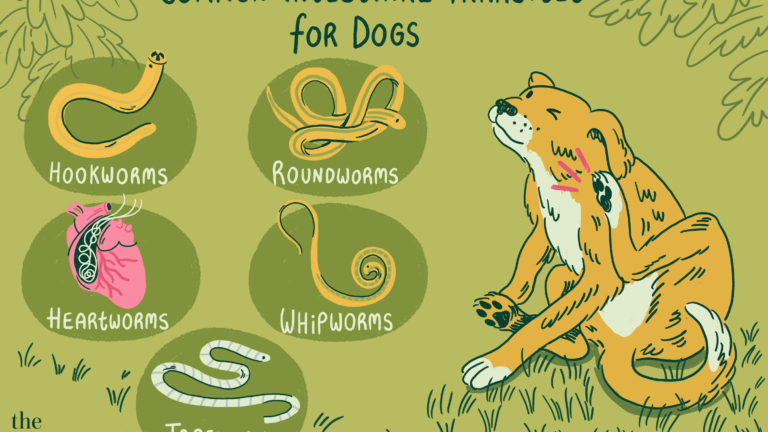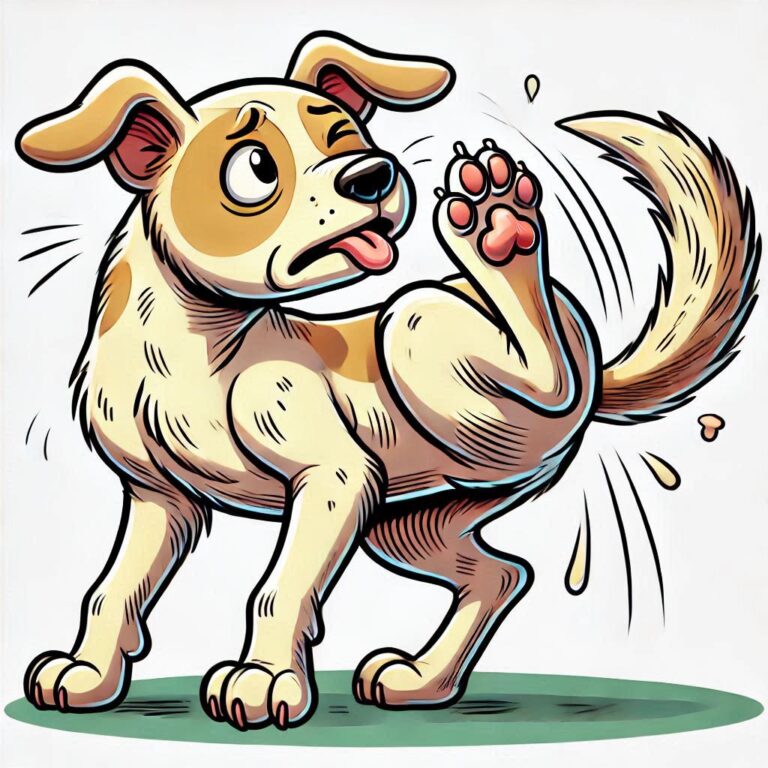Are you a dog owner? Do you have concerns about your furry friend’s health? One of the most common issues that dogs face is worm infections. While it is not a pleasant topic to discuss, it is essential to understand how your dog’s worms can affect you and your family. That’s why we have created this comprehensive guide on whether or not you can get worms from your dog.
In this article, we will explore the different types of worms dogs can get, how to tell if your dog has worms, and the potential risks for humans. We will also cover how to prevent worm infections in both dogs and humans, as well as effective treatment options. By the end of this article, you will have all the information you need to keep your furry friend healthy and happy while protecting yourself and those around you.
Worms in Dogs
Dogs are prone to getting worms, and there are several types of worms that dogs can get. Worms are parasites that live inside the intestines of dogs and can cause severe health problems. The most common types of worms found in dogs include roundworms, hookworms, whipworms, and tapeworms. Roundworms are the most common type of worm found in puppies. These worms can grow up to 7 inches long and can cause serious damage to a puppy’s organs if not treated early. Hookworms feed on your dog’s blood and attach themselves to the intestinal wall. Whipworms are another type of worm that affects dogs, which is hard to detect as they hide deep within their intestines. Canine tapeworm infections generally come from swallowing fleas or infected meat. Tapeworm eggs pass through the intestine into your dog’s stool where they can be seen as tiny moving segments resembling grains of rice. It is important to diagnose the specific type of worm affecting your dog before treatment starts. Overall, it is essential for pet owners to be aware of their dogs’ symptoms indicating possible infection with one or more forms of intestinal parasites or worms. A veterinarian’s examination should always be sought when a worm infestation is suspected, especially if treatment has been inadequate or symptoms have persisted for an extended period without improvement despite prescription medications have been given by pet owners at home based on their observations only without proper veterinary advice
What Types of Worms Can Dogs Get?
Dogs can get several types of worms, including roundworms, tapeworms, hookworms, whipworms, and heartworms. Each type of worm has its own unique characteristics and can cause different symptoms and health problems in dogs. Understanding the different types of worms is important for knowing how to prevent or treat them in your dog.
Roundworms
Roundworms are one of the most common types of worms that dogs can get. They are long and thin parasites that live in the intestines and feed on the food that your dog consumes. Roundworm infestations can cause diarrhea, vomiting, weight loss, and a potbelly appearance in puppies. These worms can be transmitted through contact with contaminated soil or feces.
Tapeworms
Tapeworms are long flat worms that live in the small intestines of dogs. They attach themselves to the intestinal wall using sucker-like mouthparts called scolexes. The body is made up of segments or proglottids that contain eggs which are shed into the environment when they mature. Dogs with tapeworm infections may show no signs other than an itchy anus or scooting on their bottom due to irritation caused by proglottids exiting the body.
Hookworms
Hookworms are another type of intestinal parasite commonly found in dogs. They have hook-like teeth that they use to attach themselves to the intestinal wall where they feed on blood from tiny capillaries causing severe anemia in some cases which may lead to weakness and death if not treated promptly. Hookworm larvae can penetrate human skin causing a rash called cutaneous larval migrans (CLM). The eggs do not stick well to fur but will stick around shady areas like under bushes.
Canine Tapeworms
Tapeworms are one of the most common types of parasites found in dogs. They are long, flat worms that can grow up to 8 inches in length and can be seen with the naked eye. Tapeworms are usually found in the small intestine of a dog and can cause a range of symptoms, including weight loss, diarrhea, and vomiting. The most common type of tapeworm is the Dipylidium caninum.
How do Dogs Get Tapeworms?
Dogs get tapeworms by ingesting fleas that contain tapeworm eggs or by eating infected raw meat. Once inside the dog’s intestines, the tapeworm eggs hatch into larvae and attach themselves to the intestinal walls. They then begin to grow into mature adults, which can produce thousands of eggs. These eggs are passed out of the dog’s body through their feces and can then infect other dogs or even humans.
Treatment for Canine Tapeworms
There are several options for treating canine tapeworm infections. Your veterinarian may recommend an oral deworming medication that kills the adult worms in your dog’s intestines. It is important to follow your veterinarian’s instructions when administering these medications as they must be given on a regular schedule to be effective. Additionally, it is important to treat any flea infestations your dog may have as fleas are a common source for tapeworm infections. Regularly grooming your pet and keeping their living environment clean can also help prevent future infestations. In conclusion, canine tapeworm infections are a common issue among dogs but with proper treatment and preventative measures they can easily be managed. If you suspect your dog has been infected with tapeworms, it is important to seek veterinary care as soon as possible to prevent the spread of parasites to other pets or humans in your household.
How to Tell If My Dog Has Worms?
Not all dogs with worms show symptoms, making it essential to detect them as early as possible. Early detection leads to a higher chance of treating the infestation successfully. Here are some signs that indicate your dog might have worms:
Dog Worm Symptoms
The most common symptom of worms in dogs is diarrhea. However, other symptoms like vomiting, weight loss, and a bloated stomach may also be present. Dogs with tapeworms may drag their anal area along the ground or lick their behind excessively. Additionally, dogs with heartworms may experience difficulty breathing or coughing.
Checking for Worms
If you suspect your dog has worms, you should conduct a fecal examination at the vet’s office. Samples of your dog’s feces will be collected and examined for the presence of eggs or larvae under a microscope. It is essential to note that not all types of worms can be detected through fecal tests, and sometimes blood work might be necessary. In conclusion, if you suspect that your dog has worms or exhibits any symptoms outlined above, it is vital to visit your veterinarian urgently. A proper diagnosis by a trained medical professional leads to more effective treatment and smoother recovery for your furry friend.
Dog Worm Symptoms
Dogs can get infected with a variety of worms, each with its unique symptoms. Identifying these signs early on can help you seek timely and effective treatment, improving your dog’s quality of life. Here are some of the common dog worm symptoms to look out for:
1. Visible Worms
If your dog has visible worms in its stool or vomit, it’s an obvious indication that it has a worm infestation. These can be long white or beige-colored roundworms, tapeworm segments resembling grains of rice, or hookworms that cause bloody diarrhea.
It is essential to take your canine friend to the veterinarian for proper diagnosis and treatment as soon as possible.
2. Changes in Appetite
Another symptom of worms in dogs is changes in appetite. While some dogs may lose their appetite altogether, others may feel hungrier than usual due to worm infestation.
If you notice such changes in your dog’s eating habits, it’s crucial to pay attention and look out for other symptoms since they could signal a serious issue such as parasites infecting the intestinal tract.
3. Abnormal Stool
A change in stool appearance or frequency could indicate that your furry friend has worms. Dogs with worms often have loose stool or diarrhea that’s abnormal compared to their normal bowel movements.
If you notice any unusual change in your dog’s bowel movement pattern like increased frequency, constipation, vomiting or diarrhea accompanied by a foul smell or bloodstains; consult with a veterinary professional right away!
How to Treat a Dog with Worms?
If you suspect your dog has worms, it is crucial to take them to the veterinarian for proper diagnosis and treatment. There are many different types of worms, and each requires a specific treatment plan. The first step in treating a dog with worms is identifying the type of worm that they have. Once the veterinarian identifies the type of worm present, they will prescribe medication to treat it. Depending on the severity of the infestation, your dog may require multiple doses over several weeks. It is essential to follow their instructions carefully and complete the full course of medication. In addition to medication, it is important to keep your dog’s environment clean and free from contamination. Regularly clean any areas where your dog spends time, such as bedding or outdoor spaces. Also, be sure to pick up after your dog when they go outside and dispose of waste properly. By taking these steps, you can help prevent reinfestation and keep both your dog and family safe and healthy.
 Can Dogs Pass Worms to Humans?
Can Dogs Pass Worms to Humans?
Dogs can pass worms to humans, especially through close contact, such as hugging or kissing. The types of worms that dogs can transfer to humans are roundworms, hookworms, and tapeworms. These worms can cause serious health complications in humans when left untreated.
Roundworms are the most common type of parasite that dogs can pass on to humans. They usually live in a dog’s intestine but can migrate to other organs and cause severe health problems for humans, particularly children. Hookworms are another type of worm that dogs can transfer to people. They attach themselves to the walls of a dog’s intestines and feed on blood. Hookworm larvae can penetrate the skin and cause itchy lesions or rashes in people.
Tapeworms are also another type of worm that dogs can pass on to humans by ingesting contaminated food or water infected with fleas that carry tapeworm eggs. The infection may not show any symptoms in humans, but they may experience abdominal discomfort or diarrhea. Therefore, it is essential always to keep your pet away from contaminated areas and regularly deworm them under veterinary supervision.
Can Humans Get Worms from Dogs?
Yes, humans can get worms from dogs. Although the likelihood of this happening is relatively low, it is still important to take preventive measures to avoid getting worm infections from your pet. The transmission of worms from dogs to humans occurs through ingestion of worm eggs that are passed through their feces. Children are particularly at risk since they tend to play with their pets and may not practice proper hygiene.
The types of worms that can be transmitted from dogs to humans include roundworms, hookworms, tapeworms and whipworms. Roundworms are the most common type of worm infection in humans caused by contact with infected dog feces. Hookworm infections occur when the larvae in dog feces penetrate human skin while walking barefoot on contaminated soil.
Tapeworm infections usually happen when people accidentally ingest fleas that carry the tapeworm larvae while playing with their pets. Whipworm infections occur when people ingest whipworm eggs present in soil contaminated with infected dog feces.
 Can I Catch Worms from My Dog?
Can I Catch Worms from My Dog?
One of the biggest concerns for dog owners is whether they can catch worms from their pets. The answer is yes, dogs can pass on certain types of worms to humans if proper hygiene practices are not followed. The most common types of parasitic worms that can be transmitted from dogs to humans include roundworms, hookworms, and tapeworms.
The transmission of parasitic worms occurs when a person comes into contact with the fecal matter or contaminated soil where infected dogs have defecated. If the eggs or larvae of these parasites are ingested or enter through a wound in the skin, they can develop into adult worms within the human body and cause various health problems such as abdominal discomfort, diarrhea, anemia and even blindness.
Children are particularly at risk due to their propensity to play in dirt and explore their environment by putting things in their mouths. It’s essential that dog owners take preventative measures such as picking up after their pet immediately, keeping them away from areas where children play and washing hands thoroughly after handling dogs or any potentially contaminated surfaces.
How to Prevent Humans from Getting Worms from Dogs?
Preventing humans from getting worms from dogs is an essential part of responsible dog ownership. While it is not common for dogs to transmit worms to humans, there are some basic precautions that you can take to minimize the risk.
Practice Good Hygiene
One of the most important things you can do to prevent the transmission of worms from your dog is to practice good hygiene. Wash your hands thoroughly after handling your dog, especially after cleaning up after them or handling their feces. It’s also a good idea to regularly clean and disinfect any areas where your dog spends time.
If you have young children in the home, be sure to supervise interactions between them and your dog. Encourage your children to wash their hands frequently, and don’t allow them to put their hands or objects in their mouths after touching your dog or anything that has come into contact with their saliva or feces.
Maintain Your Dog’s Health
A healthy dog is less likely to transmit worms than a sick one. Regular visits with a veterinarian are essential for keeping your pet healthy and parasite-free. Your vet can recommend the best parasite prevention products for your particular situation, as well as administer vaccines that will protect both you and your pet against certain diseases.
In addition, make sure that you provide clean food and water for your pet, keep up with regular grooming, and keep them away from other animals that may be infected with parasites.
Clean Up After Your Dog
Cleaning up after your dog promptly is essential for preventing the spread of parasites like hookworms and roundworms. These parasites can live in soil for long periods of time and can infect other animals or people who come into contact with the contaminated soil.
Always carry a bag or other means of picking up after your dog when you take them for walks. If your dog has an accident in the yard, clean it up as soon as possible. Be sure to dispose of feces properly, either by flushing them down the toilet (if local regulations allow) or placing them in a sealed bag and throwing them away in the trash.
By following these simple steps, you can minimize the risk of transmission of worms from your dog to you or other humans. By taking care of your pet’s health and hygiene, you’ll also be doing your part to keep yourself and those around you healthy and safe.
Conclusion
In conclusion, it is important to take preventative measures when it comes to worms in dogs. Regular vet check-ups, proper hygiene, and keeping your dog away from potentially infected areas can all help reduce the risk of your dog contracting worms. Additionally, if you do notice any symptoms or suspect that your dog may have worms, it is crucial to seek veterinary care immediately in order to prevent the spread of infection. With proper care and attention, you can keep your furry friend healthy and happy for years to come.


 Can Dogs Pass Worms to Humans?
Can Dogs Pass Worms to Humans? Can I Catch Worms from My Dog?
Can I Catch Worms from My Dog?





